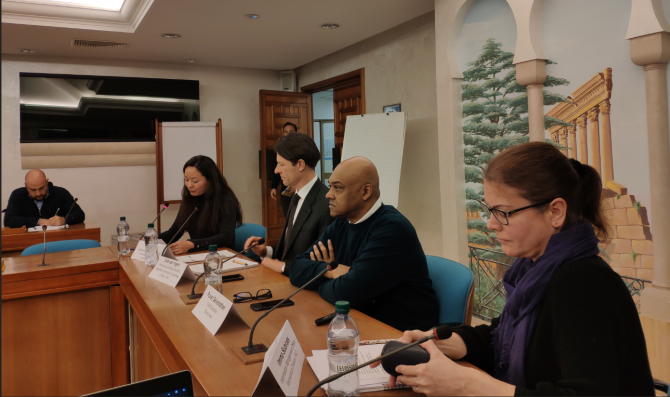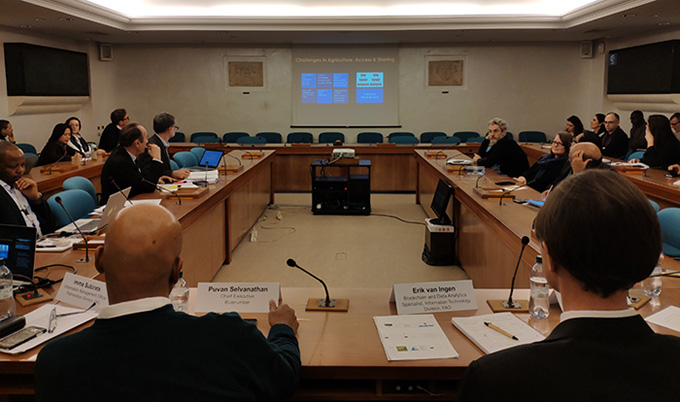The Digital Innovation Dialogue on Farmer Digital Identity and Ownership successfully held

The Food and Agriculture Organization held the first Digital Innovation Dialogue for 2020 at the FAO HQ to discuss the Farmer Digital Identity and Data Ownership and the event saw more than 40 people attending onsite and 200 online participants.
Digital inclusion of farmers is a strong instrument to combat the ‘digital divide’ in agriculture and is poised to benefit rural farmers. Nevertheless, any attempt to apply digitization to agriculture will raise the question on how to relate with the identity of the farmer, which is a key pathway to financial inclusion, index-based agriculture, markets and digital agricultural advisory services, etc.
Following giving farmers a digital identity, there is also question on how to respect and protect the ownership of their data. Social networks made mistakes by compromising the data of their users; this is an indication that there is still a long way to go in data ownership and data privacy. Certainly, we do not want to repeat the same mistakes in agriculture.
The Dialogue was opened by Ms. Meng Zeng, Information Technology Officer of the Digital Innovation Unit at FAO CIO Division where she gave a brief introduction to the Digital Innovation Dialogue. In 2019, the Digital Innovation Dialogue attracted more than 400 participants. She emphasized the importance of theme of the dialogue, “Farmer Digital Identity and Data Ownership”, which is key element for achieving the digital transformation in the Agri-food sector. She shared that Digital Innovation Dialogue would like to collect suggestion on topics or guest speakers for our next Dialogue through co-creation among FAO community. Please feel free to share your ideas to digital-innovation@fao.org

Overview of the presentations at the Digital Innovation Dialogue 8
There were three speakers lined up for this dialogue. The first speaker was, Mr. Selvanathan the Chief Executive Officer at Bluenumber who shared his vision of Farmer Digital Identity and Data ownership, explaining how digitization to agriculture is related to the identity of the farmer.
He further elaborated on the issue of ownership of this identity, stressed “You only have a right to property if you own it. Your identity is not your property. You do not own it.”
Mr. Puvan Selvanathan also gave a brief introduction of how Bluenumber tackles the Data identity and ownership issues by “Make Supply Chains Transparent, Identify Slavery, Measure Sustainability, and Open New Markets”.
The second speaker was Ms. Imma Subirats-Coll the Information Management Officer in FAO Partnership Division who introduced the “Farm Data Management, Sharing and Services for Agriculture Development Online Course”. The course was developed in 2019 by FAO and partners, the aim of the course is to strengthen the skills of professionals who use and manage data for the benefit of farmers by exposing them to the topics of importance of data in the agriculture value chain. The meeting was told that more than 5,000 participants from 153 countries have benefited from the course. Future editions are being planned.
The last speaker was Mr. Erik van Ingen, Blockchain and Data Analytics Specialist of CIO Division who also doubled as the dialogue chair. He shared his vision through a brief presentation with contribution from two other colleagues who could not be at the event.
• On behalf of Kafkas Caprazli from FAO Sub Regional Office for Eastern Africa, Erik discussed the topic of UN Legal Identity Agenda and how it is aligned with SDG 16.9: provide legal identity for all, including birth registration.
• On behalf of Stuart Tippins from CIO Division, Erik introduced the Kenya Integrated Agriculture Management Information System (KIAMIS) as a successful example, which has been shown to greatly improve processes and transparency in an area prone to abuse in terms of untraceable or greatly inflated bulk purchases of inputs.
Mr. Erik van Ingen also introduced EU’s General Data Protection Regulation (GDPR), and how blockchain fits into this context. He related the farmer’s data to “data in a social network is worth nothing without online users” - this applies increasingly also to digital agricultural service providers. He finished his presentation with linking the topic of farmer digital identity and data regulation with the upcoming International Digital Council for Food and Agriculture.
The presentations were followed by a question and answer session and the questions from the participants (including the CFS secretariat) ranged from the relation between Digital Identity and Blockchain, to the connection between farmer and consumer. There was a lively discussion on how we could work to fight the digital divide and how we can work together on policies and regulations that can protect smallholder farmers digital identity and what mechanisms that should be followed.
About FAO Digital Innovation Dialogue
Digital Innovation Dialogue was launched in early 2019 by CIO to serve as a forum to enhance knowledge sharing and mutual learning between multidisciplinary innovation practitioners and FAO staff through open and informal discussions. The previous Digital Innovation Dialogue sessions have included workshops with Alibaba Cloud, IBM’s The Weather Company, ESRI, National Telecommunication Agency in Brazil, Gartner, the Ministry of Agriculture and Rural Affairs of China, and blockchain start-ups. Topics include Digital Intelligence Platform, AI Products, Blockchain and Geospatial Technology for Agriculture, Gender Equality in Digital Transformation, Farmer Digital Identity and Data Ownership, and China’s Experiences in Digital Agriculture and Digital Village. The Dialogue has hosted more than 600 participants on-site and online.
The Digital Innovation Dialogue is an open and inclusive forum and we welcome your suggestions for topics for the next dialogue, kindly send them to digital-innovation@fao.org



